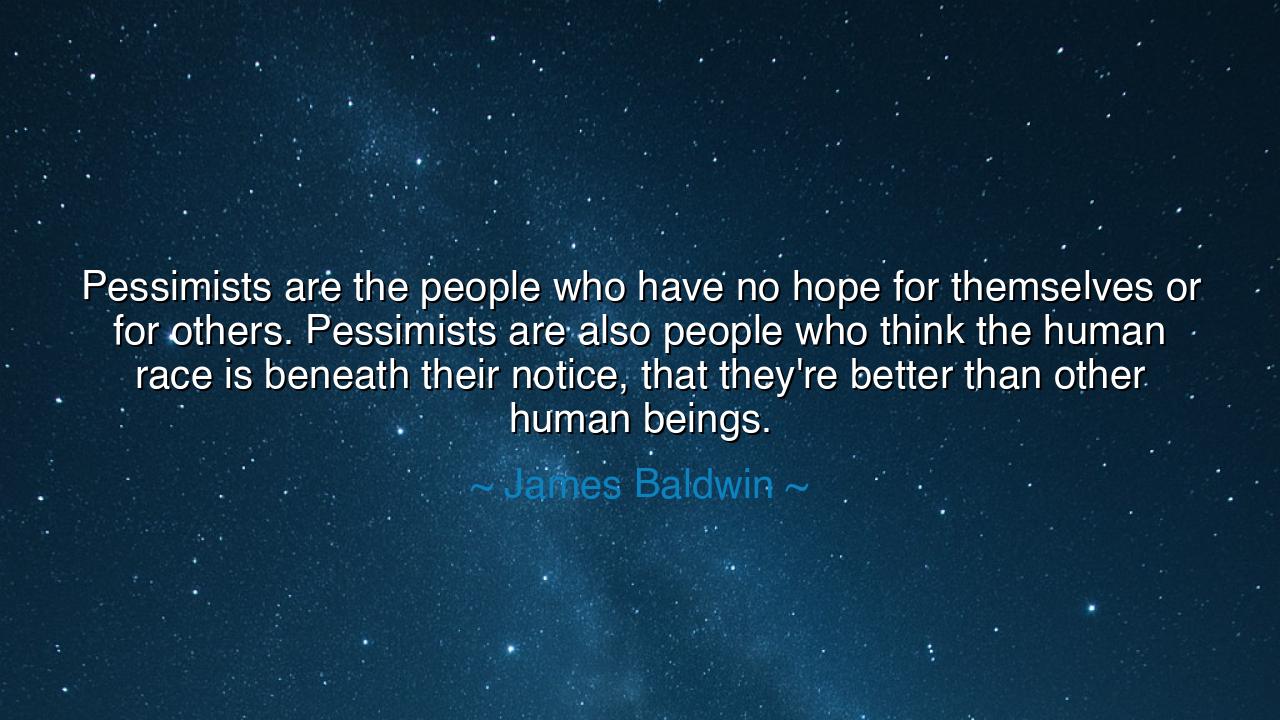
Pessimists are the people who have no hope for themselves or for
Pessimists are the people who have no hope for themselves or for others. Pessimists are also people who think the human race is beneath their notice, that they're better than other human beings.






The prophet of truth and conscience, James Baldwin, once declared: “Pessimists are the people who have no hope for themselves or for others. Pessimists are also people who think the human race is beneath their notice, that they’re better than other human beings.” In these words, Baldwin does not merely condemn despair—he exposes its hidden arrogance. For he understood that pessimism, though it often wears the mask of intelligence or realism, is at its core a failure of love. It is the quiet declaration that life cannot change, that people cannot grow, that goodness is a dream unworthy of pursuit. To Baldwin, such a spirit was not wisdom, but surrender—the cold pride of one who has turned away from both faith in humanity and faith in themselves.
This belief is born from Baldwin’s lifelong struggle to see the light within the darkness of the human condition. Living through racial injustice, exile, and the brutality of his time, he knew despair intimately. Yet he refused to bow to it. For Baldwin, hope was not naïveté—it was moral defiance. To continue believing in the dignity of man after witnessing cruelty was, for him, the highest form of courage. His quote reminds us that pessimism is not realism—it is a kind of spiritual laziness, the choice to look away from suffering rather than to confront it. To lose hope is to abandon responsibility, to declare that the world is beyond redemption so that one need not labor to heal it.
The origin of these words lies in Baldwin’s deep engagement with the human soul. He wrote them during a time when America was divided by race, violence, and hypocrisy. He watched both oppressors and victims retreat into bitterness—some despising others, some despising themselves—and he understood that such despair would only reproduce the same wounds. Pessimism, to Baldwin, was the poison that freezes compassion. It tells the heart, “There is nothing worth saving,” and once that belief takes hold, the bridges between people crumble. In his eyes, the pessimist’s pride is deadlier than hatred itself, for it cloaks itself in the guise of wisdom while draining the spirit of mercy.
History offers many mirrors to this truth. Consider the time of Nelson Mandela, imprisoned for 27 years under apartheid. He had every reason to despise humanity, every cause to surrender to despair. Yet he emerged not bitter, but forgiving—his heart intact, his faith unbroken. “If I did not leave my bitterness in prison,” he said, “I would still be in prison.” Mandela was no dreamer detached from reality; he was, as Baldwin would say, a man of hope in action. His refusal to hate was not weakness—it was mastery. For while the pessimist claims that man cannot change, the hopeful soul proves him wrong through courage and sacrifice.
Baldwin’s warning, then, is twofold: do not mistake cynicism for insight, and do not let pride masquerade as wisdom. The pessimist, in declaring mankind hopeless, elevates himself above the world—he says, in essence, “I see more clearly than those who still believe.” But such clarity is blindness. It sees only corruption, never redemption. It sees the wound, but never the healing hand. Baldwin, who saw the worst of humanity, still believed that our capacity for compassion outweighed our capacity for cruelty. For to believe otherwise, he said, is to betray not only others, but oneself—to abandon one’s own humanity in the act of condemning humanity at large.
This teaching is not easy, for hope demands labor. To believe in people is to risk disappointment; to love the world is to suffer its flaws. But Baldwin teaches that to love anyway—to believe in the possibility of transformation despite all evidence—is the only path toward truth. The pessimist, by refusing to hope, refuses to live fully. He may shield himself from heartbreak, but he also closes himself off from wonder. Hope, on the other hand, is not the denial of pain—it is the strength to endure it and still create meaning. It is the fire that keeps civilization from falling into darkness.
So, my child, remember this wisdom: Never let despair disguise itself as sophistication. To believe in the goodness of people is not to be foolish—it is to be brave. When you see corruption, fight it. When you encounter hatred, answer it with clarity and compassion. When the world tempts you to withdraw into cynicism, resist it as you would resist poison. For the pessimist builds walls, but the hopeful build bridges, and through those bridges flows the lifeblood of humanity itself.
In the end, Baldwin’s words shine as a commandment for all generations: do not rise above the world in scorn—rise within it in service. To have hope is not to deny suffering, but to refuse to let suffering define the future. Let no man convince you that to care is naïve, or that to dream is childish. For the dreamers, not the doubters, have always rebuilt the world. And when you walk through the storms of this life, remember Baldwin’s quiet truth—that the greatness of the human soul lies not in perfection, but in the faith that we can always become more than we are.






AAdministratorAdministrator
Welcome, honored guests. Please leave a comment, we will respond soon